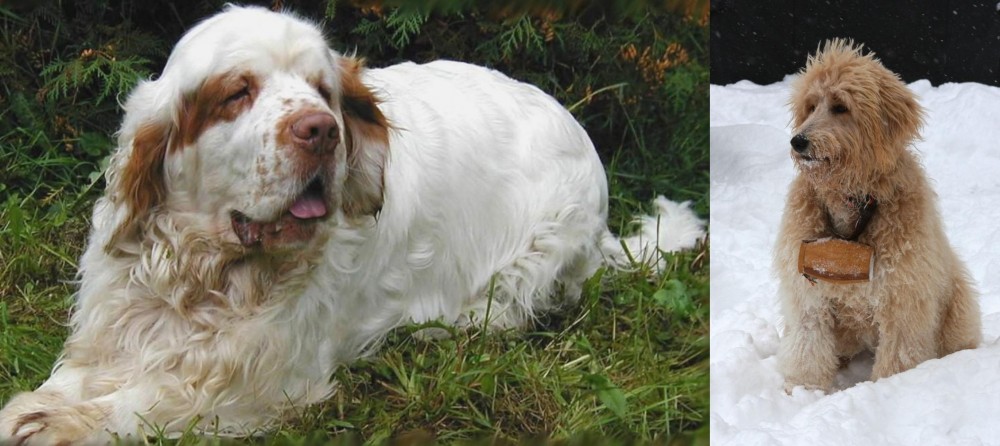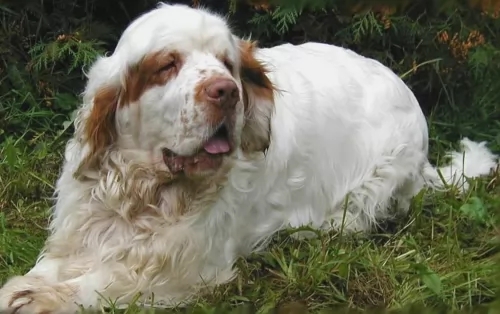 Petzlover
Petzlover Clumber Spaniel is originated from United Kingdom but Pyredoodle is originated from United States. Clumber Spaniel may grow 35 cm / 13 inches shorter than Pyredoodle. Clumber Spaniel may weigh 7 kg / 15 pounds lesser than Pyredoodle. Both Clumber Spaniel and Pyredoodle has same life span. Clumber Spaniel may have more litter size than Pyredoodle. Clumber Spaniel requires High Maintenance. But Pyredoodle requires Moderate Maintenance
Clumber Spaniel is originated from United Kingdom but Pyredoodle is originated from United States. Clumber Spaniel may grow 35 cm / 13 inches shorter than Pyredoodle. Clumber Spaniel may weigh 7 kg / 15 pounds lesser than Pyredoodle. Both Clumber Spaniel and Pyredoodle has same life span. Clumber Spaniel may have more litter size than Pyredoodle. Clumber Spaniel requires High Maintenance. But Pyredoodle requires Moderate Maintenance
 Ever since winning in Confirmation at Westminster Kennel Club’s annual show, the popularity of the Clumber Spaniel has increased markedly. The breed of Clumber Spaniel comes from the United Kingdom and it is the largest of all the spaniels. The breed is named for the Clumber Park where it was developed in Nottinghamshire. The Clumber Spaniel a=was designed to be a gundog or hunter in heavy weeds or cover. They have been popular with the Royal Family and were kept by King George V, King Edward VII, and Prince Albert.
Ever since winning in Confirmation at Westminster Kennel Club’s annual show, the popularity of the Clumber Spaniel has increased markedly. The breed of Clumber Spaniel comes from the United Kingdom and it is the largest of all the spaniels. The breed is named for the Clumber Park where it was developed in Nottinghamshire. The Clumber Spaniel a=was designed to be a gundog or hunter in heavy weeds or cover. They have been popular with the Royal Family and were kept by King George V, King Edward VII, and Prince Albert.
It is possible that during the French Revolution, the Duc de Noailles gave his spaniels to the Duke of Newcastle in Nottinghamshire, These spaniels, Alpine Spaniel, are extinct. At the time they were bred with Basset Hounds and Great Pyrenees.
Another line of thought has the Clumber Spaniel descending form an ancient Bleinheim Spaniel, which was used to later develop the King Charles Spaniel.
Whichever theory is true, we know that they were first bred and improved by William Mansell. They were shown in 1859 in England. They were bred almost exclusively by nobility until the mid-19th century. Then World War 1 caused all breeding to be discontinued and the number of Clumbers declined drastically, only to be redeveloped after the was by King George V.
The Cumber won Best in Show at the prestige’s Crufts 1991 Centenary Show. When the American Kennel Club recognized the Clumber Spaniel, there were only 9 other breeds officially recognized. They came to Canada in the same year of 1884. They are also recognized by the UK Kennel Club as a Vulnerable Native Breed. A Clumber bred by Doug Johnson won Best in Show at the 1996 Westminster Dog Show.
The Clumber Spaniel is a loyal, gentle soul who is not very friendly with strangers. They shed all the time and snore loudly.
 These dogs only originated in the 1980s, and as a designer dog they are a cross between a Standard Poodle and the Great Pyrenees, both ancient dog breeds.
These dogs only originated in the 1980s, and as a designer dog they are a cross between a Standard Poodle and the Great Pyrenees, both ancient dog breeds.
The breeders were looking for a non-shedding variation of both these popular breeds. This dog isn’t part of the American Kennel Club’s (AKC) list of dogs.
 The Clumber Spaniel is heavy-boned, with a very large head and a square muzzle. Of all spaniels, he is the biggest. His expressive face wears a dopey, sad look and his eyes are large, shaped like leaves. The muzzle is as large as the head and his nose is square. He has freckles on his muzzle and a deep chest. His legs are straight, and his feet are solid.
The Clumber Spaniel is heavy-boned, with a very large head and a square muzzle. Of all spaniels, he is the biggest. His expressive face wears a dopey, sad look and his eyes are large, shaped like leaves. The muzzle is as large as the head and his nose is square. He has freckles on his muzzle and a deep chest. His legs are straight, and his feet are solid.
The Clumber Spaniel gives off a dignified air and despite his expressions, he is ready to play or to work at any time.
 The Pyredoodle is a large dog standing at between 60 and 86cm in height and weighing about 38 to 46kg.
The Pyredoodle is a large dog standing at between 60 and 86cm in height and weighing about 38 to 46kg.
The coat varies quite a bit, depending on which breed the dog leans towards. Colors can be white, cream, apricot, silver or black. Essentially the coat is a thick double-coat of medium length hair which is fairly straight or wavy.
The dog is a low shedder, thought to have a hypoallergenic coat. Floppy ears mean you will need to check inside the ears for redness and infection brought on by an excess wax build-up, dirt and moisture. If you allow your Pyredoodle to become a parent, the can produce between 2 to 4 puppies.
Coming from dogs with good temperaments, the Pyredoodle comes as being good natured. He plays well with children and gets on well with other animals in the house.
He is protective and takes his role as watchdog seriously. You can be sure he is going to be a loyal family dog. His high intelligence means he can be trained and socialized with ease and then he becomes obedient and well mannered.
He is good with children, and even though he is looked upon as being sweet natured, he still makes a great watchdog and protector of his human family.
 Attractive to look at, independent in nature, the Pyredoodle also has watchdog characteristics, being a protector of his human family.
Attractive to look at, independent in nature, the Pyredoodle also has watchdog characteristics, being a protector of his human family.
Like any dog, and particularly big dogs, it is important to train the Pyredoodle otherwise he could be too active and unruly when he comes indoors.
The Pyredoodle will absolutely thrive in a loving home where the people enjoy an active lifestyle.
The Pyredoodle comes from too excellent dog breeds. Both breeds make excellent watch dogs, they’re intelligent dogs who can be easily be trained. You can expect your crossbreed dog to be a loving, loyal, devoted pet who will add a wonderful dimension to your household.
 The Clumber Spaniel can suffer from a variety of conditions due to its very design and genetics. Lameness early in life can be attributed to the large and fast-growing bones in the Clumber. This lameness will dissipate when the pup is fully grown. Other issues include:
The Clumber Spaniel can suffer from a variety of conditions due to its very design and genetics. Lameness early in life can be attributed to the large and fast-growing bones in the Clumber. This lameness will dissipate when the pup is fully grown. Other issues include:
Can become dehydrated and all the problems that arise from a dog being overheated and dehydrated.
Must have a caesarian section. They may also have a sensitivity to the anesthesia used in the procedure.
Hypothyroidism with ear and skin complications.
They cannot take sulfa drugs.
 Designer dogs are often bred with the idea to eliminate some of the typical, common health issues that plague most dogs. These are among others, bloat, cancer, hip dysplasia, skin issues, ear infections, obesity, dental disease and others.
Designer dogs are often bred with the idea to eliminate some of the typical, common health issues that plague most dogs. These are among others, bloat, cancer, hip dysplasia, skin issues, ear infections, obesity, dental disease and others.
It is highly unlikely that your lively Pyredoodle will succumb to any of the major dog illnesses, but you need to watch him and get him to the vet when you see him displaying unnatural symptoms.
It is beneficial for your pet's health to have it neutered or spayed if you aren't interested in the dog having puppies.
 The Clumber has a tendency to gain weight and become obese. Feed them wisely. Feed about ¼ to ½ of a cup of high quality dry dog food twice a day.
The Clumber has a tendency to gain weight and become obese. Feed them wisely. Feed about ¼ to ½ of a cup of high quality dry dog food twice a day.
This can be cervical or spinal. The discs can be bulging or ruptured. Can lead to paralysis if not treated properly.
Entropion with inward rolling of eyelid or Ectropion with outward rolling of eyelid.
The Clumber Spaniel is not the most energetic of canines. He still needs moderate exercise daily but don’t overdo it. Walks, fetch, swimming, chase or confirmation are good activities for a Clumber.
 The Pyredoodle is a large dog who will need regular exercise. Apart from walks every day, he’ll need ball- and rope games, throwing the frisbee, hide and seek games as well as games and toys that keep him mentally active as well.
The Pyredoodle is a large dog who will need regular exercise. Apart from walks every day, he’ll need ball- and rope games, throwing the frisbee, hide and seek games as well as games and toys that keep him mentally active as well.
With the Pyredoodle, never try to skimp on his food and buy the cheapest there is. He’ll get sick often because of the unwholesome ingredients such as colorants, preservatives, fillers and very few vitamins and minerals.
If you choose one of the commercially manufactured dog foods, make sure it is the high quality ones. Give him a treat now and again by providing him with tasty home-cooked food. It doesn’t have to be every day, just once or twice a week.
An excellent choice of food is boiled chicken, brown rice or pasta, sweet potatoes, carrots and spinach, all chopped up and added to the dry kibble. When you can, try and include a little bit of raw meat too. Make sure he has constant access to fresh, cool water.
The Pyredoodle can have a coat which can be either short and thick or it can be longer, wavy or quite curly. Grooming will be aimed at removing any loose hairs the dog has by brushing twice a week. The dog is a low shedder.
His floppy ears may mean you needing to check the insides to ensure they are free from infection. Other grooming for this dog includes trimming the nails, checking his eyes and looking inside his mouth for rotting teeth. A bad tooth can be terribly painful for your pet but it can also cause problems with other body parts such as the heart and kidneys.
Get your pet immediately to the vet if you suspect anything that can be detrimental to your dog’s health.